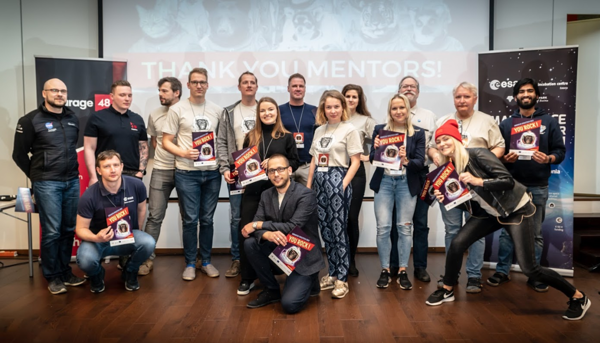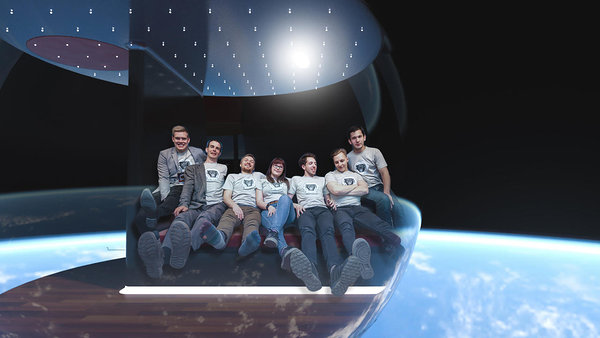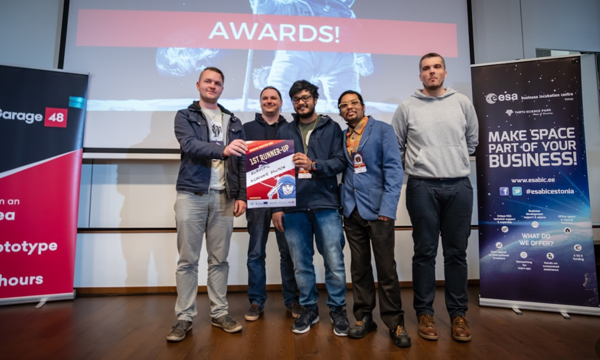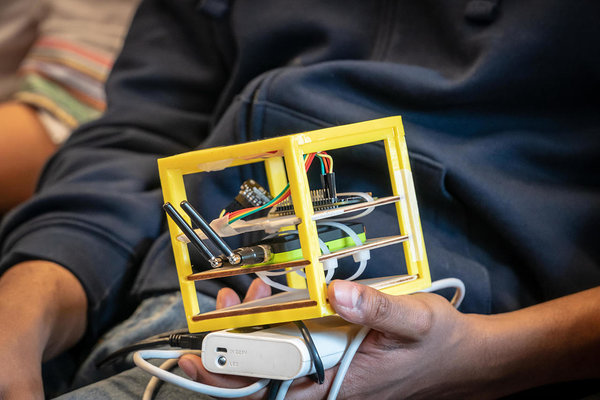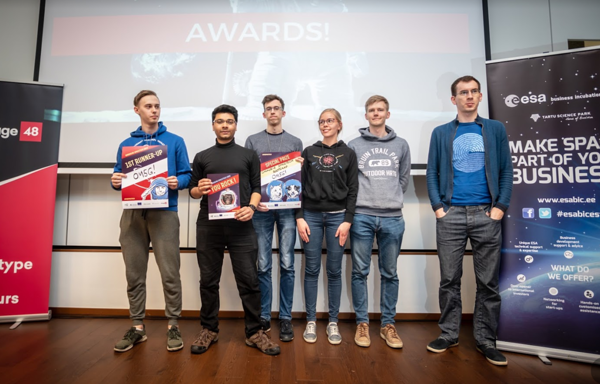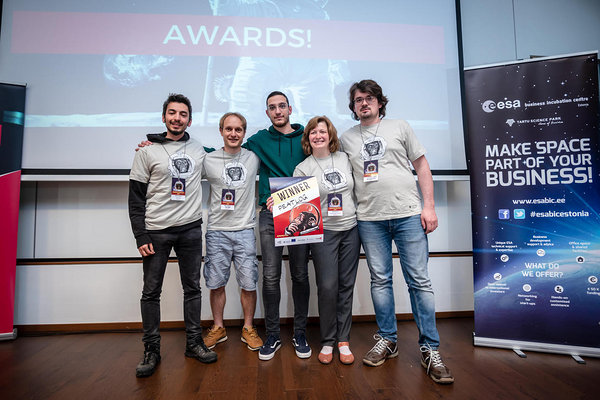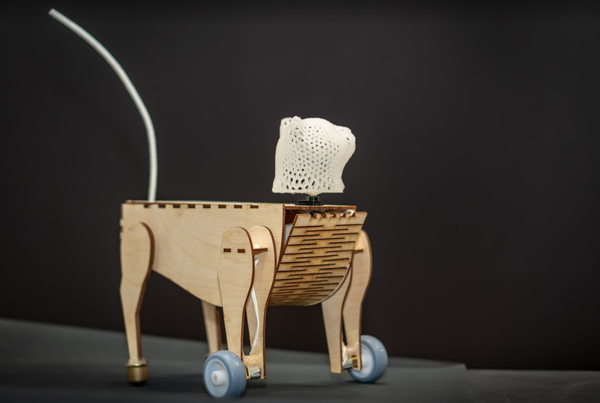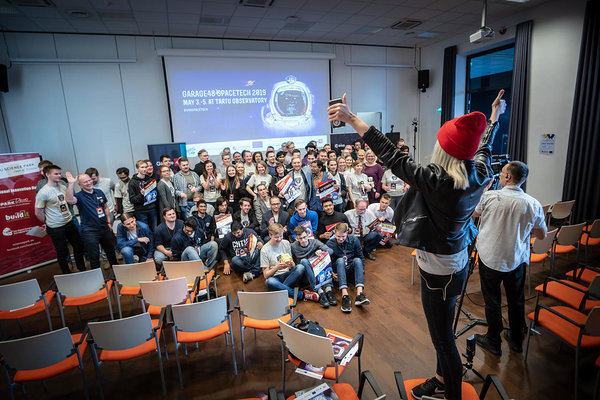On 3rd to 5th May, the legendary Garage48 SpaceTech hackathon took place for the fourth time. Out of 12 ideas pitched, 10 teams were formed and started working on their ideas. On Sunday evening, the best software and hardware project were chosen.
Taking place for the fourth time, the space-themed event has become a tradition for Garage48. “At first, the idea of a space hackathon sounded irrealistic - how can you build something in 48 hours that will fly to space? Thanks to our brave partners from ESTCube, the series of space hackathons got a good start and has grown year by year, both in numbers and in content,” recalls Kai Isand, board member of Garage48 and the initiator of SpaceTech hackathons.
The second year, international partners were brought on the board from Copernicus and Galileo satellite programs. Moreover, the first data-related prototypes were created. “By now, we have both tracks at the space hackathon: software projects that make life on Earth better by using satellite data and hardware projects that improve the technologies used on satellites,” explains Isand.
This time, the hackathon took place at Tartu Observatoorium which was an absolutely incredible venue: not only we could take advantage of their world-class labs and helpful staff, but also take a tour and see the biggest telescope in Northern Europe.
However, the teams couldn't have done it without our amazing mentors: Kai Isand, Andris Slavinskis, Kimmo Isbjornssund, Sven Lilla, Martijn Leinweber, Pätris Halapuu, Alexander Kmoch, Pauls Irbins, Aleks Koha, Ivo Remmelg, Kadri Bussov, Indrek Rebane, Marelle Ellen, Tanel Reino, Maria Laanejärv, Mari Allik, Viljo Allik, Matis Averin, Joonas Soone, Mait Lang, John C. Sullivan, Toomas Välja, Merike Liiva and Ayush Jain. Thank you for being with us!
Also, those who had to make the toughest decisions aka the jury: Priit Salumaa, Indrek Rebane, Martin Vares, Alexander Kmoch, Kadri Bussov, Martijn Leinweber, Aleks Koha.
Special thanks goes to our host and head mentor Kai Isand and the organizing team: Kadri Kõivik, Marelle Ellen, Pauls Irbins, Karoli Kahn and Merike Liiva.
Let's move on to the most exciting part: prizes!
As we welcomed all the space-related projects this year, we created separate tracks for software and hardware projects. On Sunday, two winners and two runner-ups were selected.
BOOTCAMP TEAMS: SatCraft, PeatLog, OM5G, CUBY & Stargazing
The hackathon is only the beginning. The five best teams with potential business cases got a chance to continue at Garage48 SpaceTech Bootcamp: an intensive 5-day course that consists of teamwork, intensive mentoring, hands-on lectures and inspirational talks, taking place on 29th May to 2nd June in Tartu.
At the end of the bootcamp, the teams should have finished MVP, validated their business ideas and ready for pitching to investors.
FAVORITE OF THE AUDIENCE: MoonBalloon
With a little help from massive helium-filled balloons, comfortable MoonPod and a small cup of romance, MoonBalloon is the first enterprise to offer you an intimate trip to the stratosphere with your loved one. The journey to space will end with a little splash to the Baltic Sea.
1ST RUNNER UP OF THE HARDWARE TRACK: Scientific Microwave Solution
Scientific Microwave Solution created a low-cost radio interferometric Telescope.
As the judges had the faith that team SMS will be still together in January 2020, they got free tickets and a chance to pitch at the stage of sTARTUp Day 2020 business festival in Tartu.
WINNER OF THE HARDWARE TRACK: Cuby
Cuby is an educational DIY satellite making kit for youngsters. The satellite kit is connected with the web platform, so you can see the data collected by the sensors in real time. According to the team leader, the aim of Cuby is to give youngsters the basic programming skills, experience with satellite development and integration.
Cuby was also the one who got the most awards: not only 500€ cash for their idea development but also consultation from ESA BIC, 2-month membership at SPARK Makerlab, 100kg of steel from Fractory and a special prize from Tartu Observatory.
1ST RUNNER UP OF THE SOFTWARE TRACK: OM5G
Using the city, population, and other satellite data, OM5G can map optimum locations for placement and expansion of network radios. It also helps to develop deployment strategies based on cost estimates based on deployment preferences of the telecom company and help them smartly plan their coverage range, quality, and potential revenue.
As an award, team OM5G got tickets to Latitude59 business conference to do some networking, approach the telecom companies and sign their first deals.
WINNER OF THE SOFTWARE TRACK: PeatLog
PeatLog is putting all peat mining activity on one map and comparing with declared extraction facts, Officer manages suspicious activity alerts on the map instead of going to the field or initiating long and expensive audit procedure.
After successful graduation of Garage48 SpaceTech Bootcamp, PeatLog will have a chance to pitch on the stage of Arctic15, the most effective networking startup conference in the region. Wooo!
And there are some teams who didn't get the prizes but were not less loved by the audience:
- Argus: an optical navigation system for spacecrafts;
- Stargazing: an app that helps to find the best stargazing locations in urban areas;
- SatCraft: a platform for scientists to quickly and simply design a satellite to send their experiments into space;
- Space-JTAC VR: a military virtual reality training simulator for "call-for-fire" missions;
- SpaceCat: a pet that astronauts can bring to space.
What next?
As Martijn Leinweber, Community Manager at SBIC Noordwijk and one of the judges said: "For me, the most important day is Monday – to see what are they going to do with all that they have learned this weekend. It starts with a hackathon, but it doesn't end here.”
See you at Garage48 SpaceTech Bootcamp 2019 on 29th May to 2nd June in Tartu!
The event was financed by European Regional Development Fund, sTARTUp HUB, Heliocentric Technologies Latvia and Ventspils University College.
